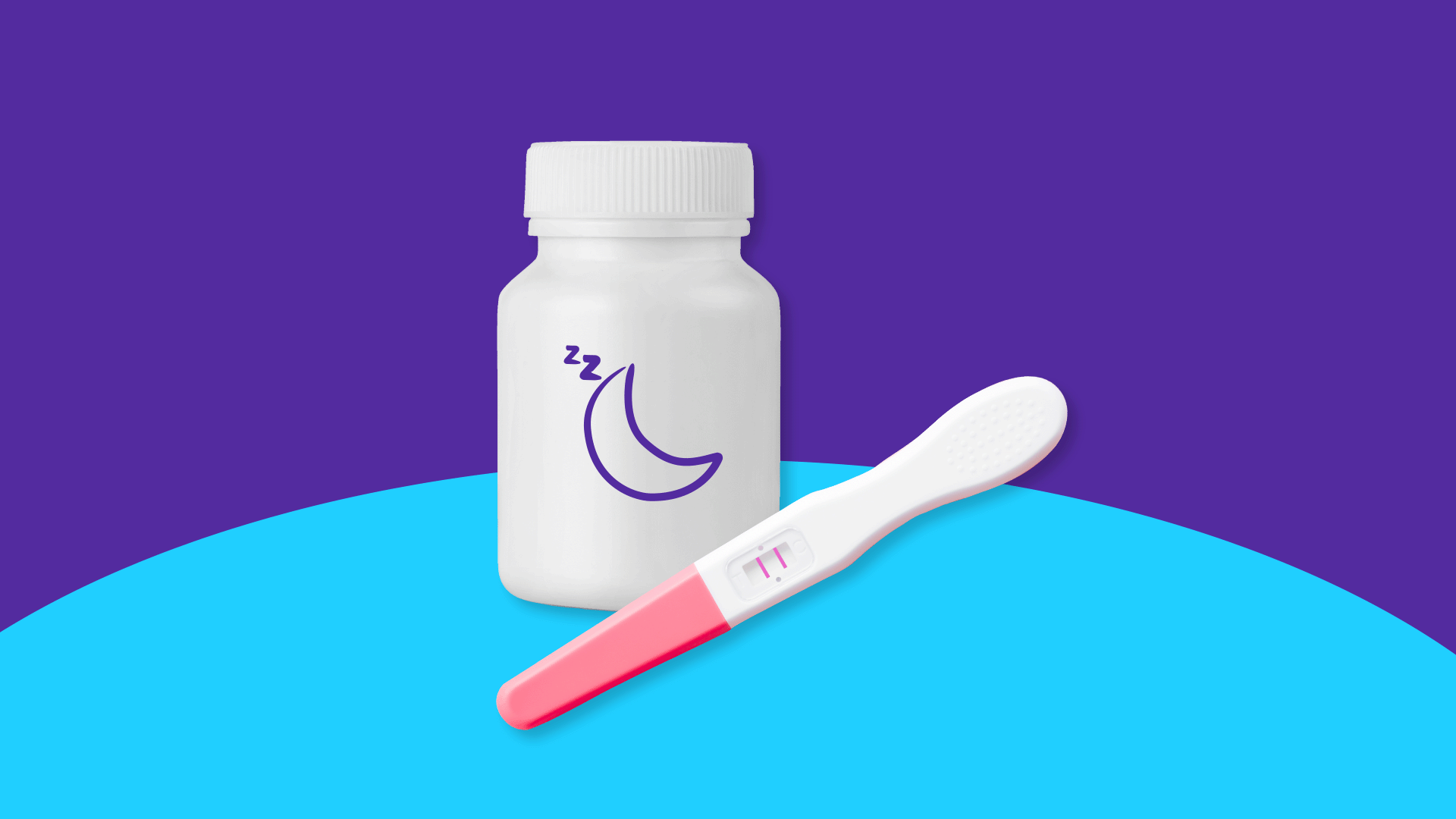If you are finding it hard to get a good night’s sleep while pregnant, you are far from alone. Between the nausea, backaches, heartburn, and endless trips to the bathroom, it can feel nearly impossible to get your z’s in. It’s no wonder why so many people are looking for tips—including pregnancy-safe sleep aids—on how to sleep soundly when pregnant.
The good news is that there are more choices than you might realize when it comes to a sleep aid while pregnant. Besides prescribed and over-the-counter medications, there are natural options and lifestyle measures to consider. Here’s what you need to know to finally get some much-needed rest.
Pregnant and can’t sleep?
Trouble falling asleep and staying asleep is very common in pregnancy. Much of it has to do with the many bodily discomforts that come with pregnancy. “In my experience, it is very rare to find a pregnant patient who sleeps well,” says Greg Marchand MD, an OB-GYN and founder of Marchand Institute. “The nausea, the baby’s movements, the back pain, the muscle aches, the constipation—literally all of it can contribute to difficulty sleeping.”
A 2020 study published in International Journal of Environmental Research and Public Health found that a whopping 77% of pregnant people experienced sleep disturbances. Of these, about 52% reported frequent night waking, and 20% had trouble falling asleep. Sleep issues increased most in the third trimester, with 26% finding it hard to fall asleep, and 62% waking up in the middle of the night.
There are several common reasons why pregnant people often find it hard to fall asleep and stay asleep. In a nutshell, there are just so many changes going on in your body—hormonally, physically, and emotionally—that make it hard to get comfortable and relaxed enough to sleep.
Some of the most common causes of sleep problems in pregnancy include:
- Frequent bathroom trips: Having to get up to pee multiple times is a common reason for sleeplessness in pregnancy. “Early on, pregnant women may have urinary frequency and nocturia—the need to urinate multiple times during the night,” says Felice Gersh, MD, an OB-GYN and founder/director of the Integrative Medical Group of Irvine, CA.
- Nausea: Nausea is very common in pregnancy, and contrary to popular belief, “morning sickness,” doesn’t just happen in the morning. Many pregnant individuals are plagued by nighttime nausea. About 70% of expectant parents experience nausea, and if the nausea occurs at night or in the early morning, it can wreak havoc on sleep.
- Heartburn: Heartburn is also common in pregnancy and tends to be worse at night when you are lying down. Heartburn also tends to get worse the further you are into your pregnancy; between 60% to 72% of pregnant people experience heartburn in their third trimester.
- Breathing issues: Hormonal changes and increased swelling of nasal tissues (rhinitis) can affect sleep during pregnancy. “Changes in hormones can affect breathing, and some pregnant women can develop some degree of sleep apnea—which can interfere with proper restorative sleep,” Dr. Gersh says.
- Restless leg syndrome: Restless leg syndrome—an uncontrolled need to move and stretch the legs during rest—is another common cause of insomnia and sleep issues in pregnancy. Between 27% to 30% of people experience this during pregnancy, particularly during the third trimester.
- Leg cramps: Almost half of pregnant women experience leg cramps, according to the American Pregnancy Association, especially starting in the second trimester. Leg cramps may be caused by weight gain, circulation changes, and increased pressure on nerves and blood vessels.
- Muscle aches and pressure: Aching backs, sore muscles, a growing belly, and babies kicking can all make sleep uncomfortable. If you find yourself tossing and turning, trying to find a comfortable sleep position during pregnancy, you are not the only one. “As you progress through pregnancy and your uterus grows, you may have difficulty finding a comfortable position for sleeping,” Dr. Gersh notes.
- Stress and anxiety: Emotions can play a role when it comes to pregnancy insomnia. “Pregnant women may develop anxiety about the health of the baby or for themselves … or they may develop some depression and anxiety when considering the challenges to come and what they may be leaving behind,” Dr. Gersh says.
In other words, there are myriad reasons you’re lying awake, counting sheep.
5 safe sleep aids for pregnancy
Pregnancy is a time when you need to take extra care to not take any medications that could harm your growing baby or cause pregnancy complications. Some common sleep aids are unsafe during pregnancy, but that doesn’t mean there is nothing you can take to help you sleep. You definitely have options. Just note that you should always consult with your healthcare provider before taking any medications for sleep.
1. Benadryl
Although antihistamines aren’t specifically meant to treat sleep issues, they can make you drowsy, so many people use them for insomnia. Most antihistamines are thought to be safe during pregnancy, and most studies have not found a link between taking antihistamines during pregnancy and birth defects. That means if Benadryl (diphenhydramine) makes you sleepy, it’s safe to take.
2. Unisom Sleep Tabs
Dr. Marchand says that Unisom Sleep Tabs (doxylamine) are another antihistamine that’s safe to take in pregnancy. However, he warns that sometimes these medications have unpleasant side effects like dry mouth and malaise. Additionally, they can sometimes be habit forming, he says, and may stop working after you’ve taken them a few times and built a tolerance to them. Unisom also offers other herbal and medicinal sleep aids that contain ingredients such as diphenhydramine or melatonin, which may be safe for use in pregnancy. Be sure to check the ingredient list when purchasing.
RELATED: 12 medications that cause dry mouth
3. Melatonin
There is limited research on the use of melatonin during pregnancy, but so far, studies have concluded that it’s probably safe to take. Melatonin is something that Dr. Marchand has found to be safe and effective in his patients. “Over the last 10 years, I have found melatonin to be effective and safe, so that is something I recommend to all pregnant women who suffer from insomnia,” he shares.
If you are interested in taking melatonin, you should speak to your healthcare provider, for medical advice about whether it’s a good idea, and what amount of melatonin you can safely take.
4. Selective serotonin reuptake inhibitors (SSRIs)
If you are finding that your stress, depression, or anxiety are so intense that you are finding it difficult to fall asleep, you should consider talking to your healthcare provider. It’s common to struggle with mental health during pregnancy.
Not all antidepressants are considered safe during pregnancy, but some are. Selective serotonin reuptake inhibitors (SSRIs) are first-line treatments for depression and anxiety—not sleep treatments, per se. In some cases, taking prescribed antidepressants can help you feel more emotionally balanced and can in turn help you fall asleep more easily.
ACOG says that most SSRIs are not known to increase the risk of birth defects, but that research is ongoing. Some providers may recommend waiting until after your first trimester is over. Additionally, some of these medications can be activating and inhibit sleep, such as sertraline. You should speak to your healthcare team to figure out the best choice for you.
5. Treatments for pregnancy discomforts
If you are experiencing one of the many pregnancy discomforts that are making a good night’s sleep feel unattainable, you might want to consider treating the underlying symptoms rather than seeking a pregnancy sleep aid. While not specifically for sleep disorders, these pregnancy-safe medications and dietary supplements can help you get more rest.
- Restless leg syndrome is often linked to low iron or pregnancy anemia, so taking folic acid or iron supplements may help relieve your symptoms. Talk to your provider about these concerns before starting any supplements..
- If your morning sickness is extreme—especially if it’s severe and interfering with sleep consistently—your doctor may prescribe an anti-nausea medication such as Diclegis or Zofran. For milder cases, ACOG recommends taking a combination of Unisom (doxylamine) along with vitamin B6 to combat nausea and insomnia.
- Some over-the-counter antacids containing calcium carbonate, like Tums, are usually considered safe in pregnancy and can relieve the heartburn and indigestion that tends to keep pregnant people up at night. Still, you should talk to your healthcare provider about other types of antacids because antacids with ingredients like magnesium trisilicate and sodium bicarbonate may not be recommended.
Unsafe sleep aids for pregnancy
Although there are some sleep aids for pregnancy that are considered safe, or low-risk, there are some that are not recommended. You’ll also want to talk to your provider about safety while breastfeeding if you plan to nurse your child.
Benzodiazepines
Benzodiazepines are a type of drug used to treat anxiety disorders and are also often prescribed for insomnia. But they are usually not considered safe to use in pregnancy. “Benzodiazepines like Valium (diazepam) and Xanax (alprazolam) are definitely unsafe,” Dr. Marchand says.
Benzodiazepines cross the placenta and may have harmful effects on babies including an increased risk of preterm birth and low birth weight. Some babies born to parents who take benzodiazepines during pregnancy have what is described as “floppy baby syndrome.” Babies may also have benzodiazepine withdrawal symptoms at birth.
Ambien (zolpidem)
Ambien is a commonly prescribed sleep medication. There is limited knowledge about how it affects pregnancy, Dr. Marchand explains, and it’s for this reason that most doctors do not recommend it. The FDA warns that taking Ambien in the third trimester is particularly risky, as it may cause babies to experience respiratory depression as well as increased sedation.
RELATED: Ambien side effects
Barbiturates and tranquilizers
Although substances like barbiturates and tranquilizers may be used at times when you are having trouble sleeping, they should not be used at any time during pregnancy, Dr. Gersh warns. “They come with concerns over the long term health effects on a baby,” she says.
Alcohol and marijuana
Alcohol is also a substance you should never consume while pregnant, says Dr. Gersh, even if you think it will help you sleep. Alcohol can cause growth problems for babies and can negatively affect their developing brains.
Some expectant parents might consider marijuana as a way to get some sleep, but Dr. Gersh advises against this as well. The American College of Obstetricians and Gynecologists (ACOG) warns against the use of recreational or medicinal marijuana during pregnancy. That includes CBD products—the FDA warns there may be serious risks to use during pregnancy and while breastfeeding.
Natural remedies for insomnia during pregnancy
When it comes to treating insomnia during pregnancy, Dr. Gersh recommends starting by considering at-home remedies and good sleep hygiene practices before turning to a pharmaceutical sleep aid for pregnancy. That said, not all natural-sounding remedies are recommended, says Dr. Gersh. Most herbal remedies haven’t been studied in terms of safety during pregnancy, and the same goes for essential oils, she explains.
Still, there are several natural remedies that Dr. Gersh does recommend, and which she has found to be successful in helping pregnant people get good sleep, including:
- Drinking herbal teas, such as chamomile
- Taking magnesium supplements
- Getting a pregnancy massage
- Breathing exercises
- Meditating before bed
- Incorporating walking and other forms of exercise into your day
- Getting plenty of sunshine and fresh air
- Maintaining a consistent sleep schedule and routine
If you’re dealing with nausea that’s making sleep hard to come by, natural remedies that are known to help include eating smaller, more frequent meals, adding protein to meals when possible, and taking ginger supplements or drinking ginger tea.
If frequent urination is keeping you up, try to meet your daily water intake earlier in the day and reduce fluids two hours before bedtime.
You may also benefit from decreasing the amount of caffeine you consume, limiting screen time before bed, taking a warm bath, or listening to relaxing music before bed. Destressing and making your environment more relaxing can help immensely with sleep. And although figuring out how to sleep when pregnant can be a challenge, there are many different pregnancy pillows on the market that can make side-sleeping more comfortable.
The bottom line is that sleep deprivation in pregnancy isn’t just something you should “put up” with. Research has found that if left unchecked, lack of sleep during pregnancy can increase your risk of complications such as high blood pressure, preeclampsia, gestational diabetes, preterm birth, lengthier labor, and cesarean section birth.
But beyond that, being sleep deprived is no fun, and all of us deserve a good night’s sleep, especially those of us who are gestating a brand new baby. And trust us, you’ll want to bank some sleep now, before your sweet, up-all-night little one joins the picture.
Sources
- Sleep Problems in Pregnancy—A Cross-Sectional Study in over 7000 Pregnant Women in Poland, International Journal of Environmental Research and Public Health (2020)
- Bothersome lower urinary symptoms during pregnancy: a preliminary study using the International Consultation on Incontinence Questionnaire, African Health Sciences (2011)
- Morning Sickness, The Cleveland Clinic (2023)
- Heartburn in pregnancy, BMJ Clinical Evidence (2013)
- Get a Good Night’s Sleep During Pregnancy, John Hopkins Medicine
- Insomnia during pregnancy: Diagnosis and Rational Interventions, Pakistan Journal of Medicinal Sciences (2016)
- Leg Cramps During Pregnancy, American Pregnancy Association
- Diphenhydramine, Mother to Baby (2023)
- Pharmacological Treatment of Insomnia, Pharmacy & Therapeutics (2015)
- Unisom products, Unisom
- Melatonin use during pregnancy and lactation: A scoping review of human studies, Brazilian Journal of Psychiatry (2022)
- Insomnia and sleep deficiency in pregnancy, Obstetric Medicine (2015)
- Depression During Pregnancy, The American College of Obstetricians and Gynecologists (2024)
- Morning Sickness: Nausea and Vomiting of Pregnancy, The American College of Obstetricians and Gynecologists (2023)
- Heartburn During Pregnancy, University of Michigan Health (2023)
- Ambien label, U.S. Food and Drug Administration
- Alcohol Use During Pregnancy, Centers for Disease Control and Prevention (2023)
- Marijuana Use During Pregnancy and Lactation, The American College of Obstetricians and Gynecologists (2017)
- What You Should Know About Using Cannabis, Including CBD, When Pregnant or Breastfeeding, U.S. Food & Drug Administration
- Effect of Magnesium Supplement on Pregnancy Outcomes: A Randomized Control Trial, Advanced Biomedical Research (2017)
- The Effectiveness of Ginger in the Prevention of Nausea and Vomiting during Pregnancy and Chemotherapy, Integrative Medicine Insights (2016)
- How To Stop Frequent Urination at Night, The Cleveland Clinic (2022)











